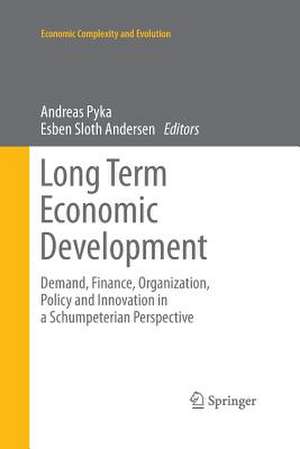Long Term Economic Development: Demand, Finance, Organization, Policy and Innovation in a Schumpeterian Perspective: Economic Complexity and Evolution
Editat de Andreas Pyka, Esben Sloth Andersenen Limba Engleză Paperback – 7 iul 2015
| Toate formatele și edițiile | Preț | Express |
|---|---|---|
| Paperback (1) | 576.85 lei 38-44 zile | |
| Springer Berlin, Heidelberg – 7 iul 2015 | 576.85 lei 38-44 zile | |
| Hardback (1) | 588.15 lei 38-44 zile | |
| Springer Berlin, Heidelberg – 2 iul 2013 | 588.15 lei 38-44 zile |
Preț: 576.85 lei
Preț vechi: 721.07 lei
-20% Nou
Puncte Express: 865
Preț estimativ în valută:
110.38€ • 115.55$ • 91.33£
110.38€ • 115.55$ • 91.33£
Carte tipărită la comandă
Livrare economică 01-07 aprilie
Preluare comenzi: 021 569.72.76
Specificații
ISBN-13: 9783642427527
ISBN-10: 3642427529
Pagini: 492
Ilustrații: VI, 483 p.
Dimensiuni: 155 x 235 x 26 mm
Greutate: 0.68 kg
Ediția:2013
Editura: Springer Berlin, Heidelberg
Colecția Springer
Seria Economic Complexity and Evolution
Locul publicării:Berlin, Heidelberg, Germany
ISBN-10: 3642427529
Pagini: 492
Ilustrații: VI, 483 p.
Dimensiuni: 155 x 235 x 26 mm
Greutate: 0.68 kg
Ediția:2013
Editura: Springer Berlin, Heidelberg
Colecția Springer
Seria Economic Complexity and Evolution
Locul publicării:Berlin, Heidelberg, Germany
Public țintă
ResearchCuprins
Introduction.- Schumpeter's Core Works Revisited.- Back to Engel?- Technological Regimes and Demand Structure in the Evolution of the Pharmaceutical Industry.- Innovation and Demand in Industry Dynamics.- Production and Financial Linkages in Inter-Firm Networks.- Does History Matter?- Innovation, Real primary Commodity Prices and Business Cycles.- Knowledge Flows in High-Tech Industry Clusters.- The International Diffusion of Biotechnology.- The Internet as a Global Production Reorganizer.- Looking Around: the Smart Way of Italian SMEs to Innovate.- Strategic Fit Between Regional Innovation Policy and Regional Innovation Systems.- Schumpeterian Patterns of Innovation and the Sources of Breakthrough Inventions.- R&D, Patents and Stock Return Volatility.- On Profit Differentials Between Persistent and Occasional Innovators.- Financial Factors and Patents.- Building Systems.- What Causes Creative Destruction?- Markets and Organizations.- Financial System and Technological Catching-Up.
Notă biografică
Andreas Pyka graduated in Economics at the University of Augsburg in 1998 and spent afterwards two years as a Post Doc in Grenoble, France participating an European research project on innovation networks. Following the Post Doc he worked as an assistant professor at the University of Augsburg. His fields of research are Neo-Schumpeterian Economics and Evolutionary Economics with a special emphasis on numerical techniques of analysing dynamic processes of qualitative change and structural development. From October 2006 to March 2009 he worked at the University of Bremen as Professor in Economic Theory. Since April 2009 Andreas Pyka holds the chair for innovation economics at the University of Hohenheim, Stuttgart. Esben Sloth Andersen is professor of economics at the Department of Business and Management, Aalborg University in Denmark. He teaches general economics and evolutionary economics in BA, MA, and PhD programmes. He is a member of the department's IKE Group on Innovation, Knowledge and Economic dynamics, and of the Danish Research Unit for Industrial Dynamics (DRUID).
Textul de pe ultima copertă
The book gives an overview of important research topics recently addressed in evolutionary Neo-Schumpeterian Economics. The list of research questions and applications of Neo-Schumpeterian reasoning impressively demonstrates the rich possibilities ranging from theoretical issues addressing human behaviour to applied areas like the emergence of biotechnology in developing countries, the role of innovation on financial markets and the R&D strategies of multinational enterprises. The chapters in this book bring together a rich set of new analytical and empirical methodologies which allow for new relevant and rigorous insights in innovation processes which are responsible for economic development and structural change.
Caracteristici
A broad set of industries and the role innovation plays for them is covered New data sets describing so far not analyzed aspects of innovation are applied The list of authors comprises the most productive researchers in this area worldwide? Includes supplementary material: sn.pub/extras























